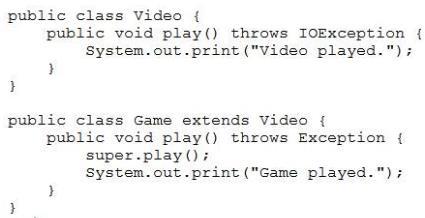Question 26
Given:

What is the result?

What is the result?
Question 27
Given the code fragments:

and

What is the result?

and

What is the result?
Question 28
Given the code fragments:
public class Book implements Comparator<Book> {
String name;
double price;
public Book () {}
public Book(String name, double price) {
this.name = name;
this.price = price;
}
public int compare(Book b1, Book b2) {
return b1.name.compareTo(b2.name);
}
public String toString() {
return name + ":" + price;
}
}
and
List<Book>books = Arrays.asList (new Book ("Beginning with Java", 2), new book ("A Guide to Java Tour", 3)); Collections.sort(books, new Book()); System.out.print(books); What is the result?
[A Guide to Java Tour:3.0, Beginning with Java:2.0]
public class Book implements Comparator<Book> {
String name;
double price;
public Book () {}
public Book(String name, double price) {
this.name = name;
this.price = price;
}
public int compare(Book b1, Book b2) {
return b1.name.compareTo(b2.name);
}
public String toString() {
return name + ":" + price;
}
}
and
List<Book>books = Arrays.asList (new Book ("Beginning with Java", 2), new book ("A Guide to Java Tour", 3)); Collections.sort(books, new Book()); System.out.print(books); What is the result?
[A Guide to Java Tour:3.0, Beginning with Java:2.0]
Question 29
Given the code fragment:

Which code fragment, when inserted at line n1, ensures false is printed?

Which code fragment, when inserted at line n1, ensures false is printed?
Question 30
Given the code fragment:
List<Integer> codes = Arrays.asList (10, 20);
UnaryOperator<Double> uo = s -> s +10.0;
codes.replaceAll(uo);
codes.forEach(c -> System.out.println(c));
What is the result?
List<Integer> codes = Arrays.asList (10, 20);
UnaryOperator<Double> uo = s -> s +10.0;
codes.replaceAll(uo);
codes.forEach(c -> System.out.println(c));
What is the result?

